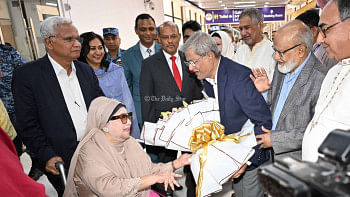Forced labour: The law of the jungle!
A disproportionate amount of focus on sex trafficking draws the attention away from the countless male trafficked victims faced forced labour episodes whose we seldom meet as hawkers in the bustling street of a vibrant city selling newspapers or popcorns. They are seen as pulling their all weight over to lure customers with their sarcastic gesture so that they can escape poverty and defy everyday's hellish reality. In disguise, they are just fighting with their physical wounds and grief what they had during their captivity in a foreign land. Somehow, perhaps they might fall prey to the lucrative job offers by the traffickers and were gripped by their malevolent motives.
The twist revolves around the culprits or traffickers who usually plot the vicious cycle of human trafficking. However, the notorious drives of these traffickers mostly have been observed in poverty-stricken regions of rural Bangladesh who are well trained to trap poor folks and fortune seekers. These wicked brokers stay in the bottom of the highly structured international trafficking racket. It is notable that shedding crocodile tears in the struggle of a poor fellow and fuels the person to be economically affluent through taking a trip abroad can't be usual rather fishy from an anonymous guy. Their strange behaviour pops up doubt in the minds of conscious people and in most of the cases they are figured out as traffickers. Moreover, fraudulent conduct has been mentioned in the Human Trafficking Deterrence and Suppression (HTDS) Act 2012 as means while constituting the crime human trafficking.

However, mostly agonising poverty and terrible ambition allow some to grab up this precarious offer. Embracing these proposals one can only dig his own grave. In this process, unfortunate victims are promised to give attractive salary package and decent place to live in. Nonetheless, eventually they find their passport to be confiscated and discover themselves get confined in the exploitative environment where they are replaced with the machine working dawn to dusk in the industry, brick kilns or agricultural land for almost no money. Even no one shows empathy to feed them. Hence the modern slavery enterprise is thriving in exchange of the sweat and blood of poor fellows. Our continuous ignorance and denial pave these unscrupulous businessmen's way to turn out as tycoons. In the wave of this consumerist society, we also enjoy the product which comes from the menace of trafficking victims and forced labour.
The tensions about the incidents of forced labour have been brewing which now a day makes up 45% of share in the realm of human trafficking occurrences. For instances, men in Cox's Bazar gave $500 in a loan to the migrant worker, and he was asked to work in the construction company of Malaysia, which loan is deceitfully manipulated to shackle this man and his families for years.
In the light of these sporadic stories, it is readily apparent that the awful forms of human trafficking put the ethos of human rights in danger and make lives of vulnerable individuals fragile. Treating migrants in a ruthless way and insisting them to contribute energy in the abusive environment not only drag them to have some spine-tingling experience but also clip their wings to drive life on their way. The incidents of forced labour along with their consequences contribute to the highest degradation of human dignity although we know the human dignity is the quintessence of human rights. In addition, a subsequent ILO Convention No. 105, adopted in 1957, signifies that forced labour cannot be considered as the part of economic development. Strikingly International Labor Organization (ILO) found that around the world 7.8 million people who have got locked in the death valley of forced labour become the favourite investment of business enterprises run by the corrupt businessmen as these evil tactics lead them to climb up the tower of wealth.
Despite experiencing the catastrophic impact of forced labour in the job market, unfortunately, timidness in responding to these criminal incidents is prominent. But every cloud has a silver lining. The appearance of HTDS Act 2012 as silver lining bridges these gaps in sections 2(4) and 2(3) respectively through the insertion of the notions of forced labour and debt bondage. On the other hand, the legislation should have embedded all the potential scenarios of forced labour mentioned above and the consequences of debt bondage as well.
Forced Labor, the terrible form of human trafficking is an ugly sore in the vast fabric of human rights. Confiscation of human dignity and commoditising the human spirit knock down the sophistication of the human rights that attributes and push the powerless fraction of society to get shattered.
The writer is a Volunteer at Northern Settlement Services (Assisting migrants and refugees in Newcastle) Australia.

 For all latest news, follow The Daily Star's Google News channel.
For all latest news, follow The Daily Star's Google News channel. 



Comments